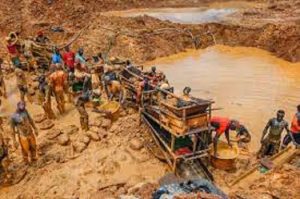Galamsey: Ghana Institutes of Architects, Engineering, Surveyors, Planners, others call for immediate ban

Five prominent professional bodies in Ghana’s built environment sector have joined forces to demand an immediate ban on illegal mining, popularly known as “galamsey,” in forest reserves and water bodies across the country.

Ghana’s built environment professional bodies are sounding the alarm on the devastating impact of illegal mining, or “galamsey”, on the country’s environment, wildlife, and public health, urging the government to take immediate action to ban the practice in forest reserves and water bodies.
The Ghana Institute of Architects, Ghana Institution of Engineering, Ghana Institution of Surveyors, Ghana Institute of Planners, and Institute of Engineering Technology – Ghana have issued a joint statement, describing galamsey as a “national security concern” that poses severe threats to the nation’s existence, environment, wildlife, and public health.
The professional bodies in a statement on Thursday September 12,2024 expressed deep concern over the devastating impact of galamsey on Ghana’s land use and environmental management systems, highlighting the challenges facing the country’s ecosystems, agricultural productivity, and citizenry health.
‘’The galamsey situation is rapidly escalating, with perpetrators becoming increasingly bold and their activities spreading across the country. These individuals operate with impunity, often under the watchful eyes of government officials, and carry out their activities openly in rivers, forest reserves, and along public roads in all the mining communities. The disregard for laws and regulations is apparent, and the situation is detrimentally deteriorating’’, the release indicated.
They point to the alarming rate of deforestation, soil erosion, and water pollution, with Ghana losing approximately 2.5 million hectares of forest reserve to galamsey over the past decade.
The ecological footprint of galamsey is extensive, with the destruction of forest reserves and contamination of water bodies devastating ecosystems and leading to the loss of wildlife habitats and diminished biodiversity.
The statement emphasizes the severe health risks associated with galamsey, including respiratory problems, skin diseases, gastrointestinal disorders, and long-term exposure to toxic chemicals linked to neurological damage, kidney failure, cancer, and other serious conditions.
It said,’’ the health risks associated with galamsey are severe and scary. The populace near these mining sites are exposed to polluted water, land and air, leading to respiratory problems, skin diseases, gastrointestinal disorders, and other health issues. Long-term exposure to the toxic chemicals used for galamsey is linked to neurological damage, kidney failure, cancer, and other serious conditions. The degradation of natural resources and pollution of water sources threaten the sustainability of livelihoods, potentially resulting in a future where basic necessities are scarce’’.
The professional bodies urge the government to take immediate action to ban galamsey and other forms of mining activities in forest reserves and water bodies, citing the need to protect Ghana’s natural resources, environment, and citizenry.
This call to action comes as the galamsey crisis continues to escalate, with perpetrators operating with impunity and causing unprecedented damage to the nation.
The professional bodies’ joint statement adds to the growing chorus of voices demanding action to address this critical issue.
They noted that, ’’It is crucial for all stakeholders—government, civil society, traditional authorities, and private sector entities—to collaborate in combating the galamsey crisis. Success will require a unified approach, free from discrimination, ensuring that all perpetrators, regardless of their status or affiliation, are held accountable. Without decisive action, the future of Ghana remains at grave risk’’.
‘’we the Built Environment Professional bodies are committed to working collaboratively with Ghanaians, other professionals, and all relevant stakeholders to take all necessary legal steps to ensure that the government and all players are mobilised to combat and ultimately stop illegal mining. Together, we can safeguard Ghana’s natural resources, protect our environment, and secure a sustainable future for all’’.
Source: Ghana/otecfmghana.com/Jacob Agyenim Boateng




